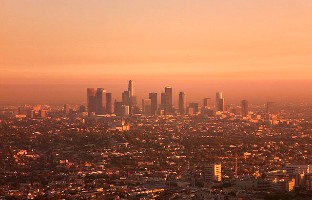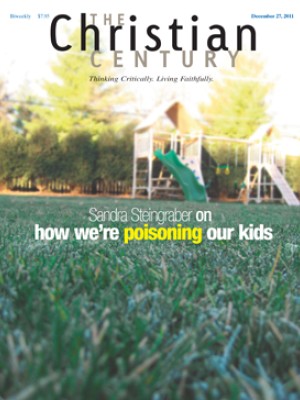Scorched earth

How is it possible to read the first chapter of the Bible and not be an environmentalist? The stunning and unique affirmations of Genesis 1 point to a creation that is good, one that reflects the being and will of God. The first and primary human moral obligation is to take care of the place. How can people who believe that the Bible is or contains the word of God ignore this directive?
In the U.S., it is a particularly dicey time for those concerned about the environment given the fractured political atmosphere and the absence of rational discourse in the primary election campaign. Sandra Steingraber presses to revive the conversation. In an interview ("How we're poisoning our children"), she discusses the environmental crisis we are in and puts it in ethical context. She invokes one of my personal heroes, Presbyterian minister and newspaper publisher Elijah Lovejoy, who opposed slavery and was killed in a proslavery riot in the 1830s.
Read our latest issue or browse back issues.
Steingraber calls President Obama's recent override of EPA protections against smog pollution the worst decision the administration has made. Smog leads to ozone, she reminds us, and "ozone kills people—elders and infants disproportionately." The dilemma is that our economy has become dependent on ruinously destructive practices. Steingraber calls our dependency on fossil fuels a "homicidal abomination."
So why aren't we talking about this? Why have global warming and environmental concerns disappeared from the political agendas of both parties? In the October 16 New York Times, reporter Elisabeth Rosenthal observed that as recently as the 2008 presidential election, both candidates John McCain and Barack Obama warned about human-influenced global warming and publicly supported legislation to curb emissions. Only the U.S., says Rosenthal, has stopped talking about it. Europe has always been ahead of us on this issue, and emerging economies like those of India, China and Brazil are pursuing "aggressive climate politics."
But in the United States, says Rosenthal, the issue has been hijacked by powerful right-wing leaders who have made "skepticism about man-made global warming into a requirement for electability, forming an unlikely triad with antiabortion and gun-rights beliefs."
I am disappointed that the president overrode the EPA on emissions. I am also disappointed that ideologically driven politicians have transformed an issue that has everything to do with our future into a political litmus test, so that no one in either party can risk talking about it.
We could let the discouraging reality of the environmental crisis lead us to despair. But Steingraber calls this despair the "biggest obstacle to social and environmental justice."
Instead, in such a time as this, we need more activists like Steingraber, those who firmly refuse to lose hope and who believe that people of good will and reasonable intelligence can act to pull us out of this crisis and ensure a viable future for our grandchildren.






